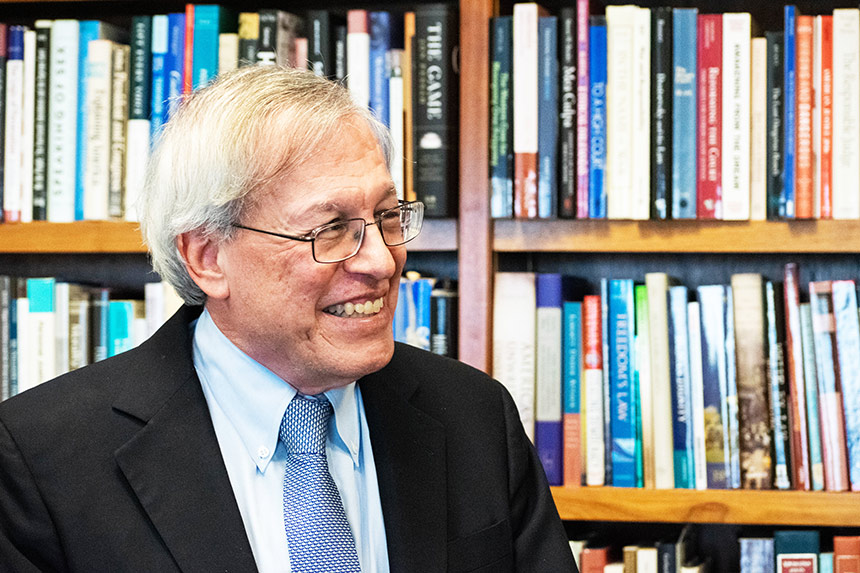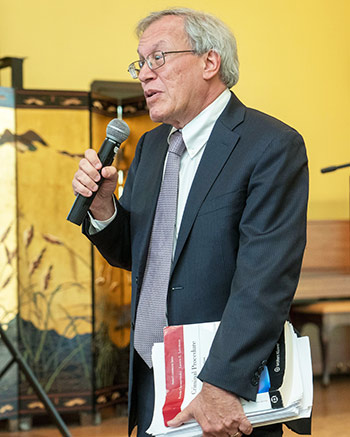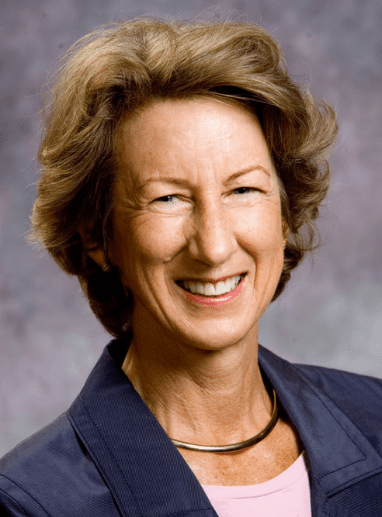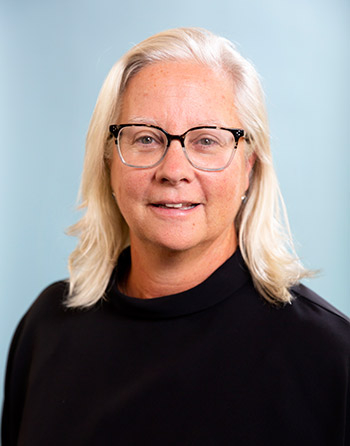
By Andrew Cohen
Starting his one-year term as the Association of American Law Schools president, Berkeley Law Dean Erwin Chemerinsky wants legal education to confront society’s increasingly vexing problems head-on.
The theme for his presidency — how law schools can make a difference — reflects his belief in the ability and obligation of law schools to help propel positive change, when the stakes to do so have rarely been higher.
“I have been teaching for over 40 years and I never have seen my students so discouraged,” Chemerinsky said Jan. 8 during his AALS Annual Meeting presidential address. “They see a country that has lost faith in the institutions of government … a political system that is broken.”

He noted dismal approval ratings for recent President Donald Trump and current President Joe Biden, how the Supreme Court’s approval rating is the lowest in American history, and that Congress’s approval rating is “at about 18 — and I worry that’s 18 people, not 18%.”
Citing polls showing that 70% of Republican voters believe the 2020 election was stolen from Trump, how 19 states have adopted laws making it harder for voters of color to cast ballots, partisan gerrymandering, climate change, racial strife, and the rise of authoritarian governments around the world, Chemerinsky sees a vital role for law schools.
“The only thing about which there seems to be a consensus is that American society, and the world, are facing unprecedented dangers,” he said. “My hope is that all of us, liberal or conservative, can agree that change is essential and that law schools should make a positive difference. My request and my challenge — to those planning programs at AALS for next year, to the other work of AALS sections, to my fellow deans, and to my fellow law teachers — is to focus on what we as academics, as leaders on matters of law, and as law schools can do to bring about positive change.”
Twice named the most influential person in U.S. legal education by National Jurist magazine, Chemerinsky has served the AALS in various capacities for decades. He becomes its sixth president from Berkeley Law, after Orrin McMurray, William Prosser, Sanford Kadish, Herma Hill Kay, and Rachel Moran.
The AALS also honored Berkeley Law Professor Emerita Eleanor Swift and Field Placement Program Director Sue Schechter. Swift received the AALS Evidence Section’s John Henry Wigmore Award for Lifetime Achievement, and the Section on Pro Bono and Public Service Opportunities (which Schechter chairs) was named co-section of the year.
Digging in
Recently reappointed to a second five-year term as Berkeley Law’s dean, Chemerinsky outlined several areas for consideration. They include changing the content of existing courses and creating new ones, adding and requiring classes on race and the law and topics such as climate change, and urging colleagues to focus their scholarship on the hardest issues and how to address them.
“It certainly must include enhanced support for public service and pro bono work by students and faculty,” he said. “Such work can make a huge difference in people’s lives and in facilitating social change. As deans and professors we must do pro bono work, including to be a model for our students. As institutions we must find more ways to encourage and support this.”
Chemerinsky also stressed the need to recruit more students from underrepresented groups, suggesting that law schools build better pipeline programs that reach out to high school and even junior high students.
Cautioning against quick-fix approaches, Chemerinsky asserted that incremental progress through vigilant work provides a more realistic path to progress. Using same-sex marriage and desegregation as examples, he said “multiple actors and institutions” paved the way for effective legal and social change.
“A magical moment when the law and society are dramatically altered makes for great movies and television,” Chemerinsky said. “But it does not work that way in practice … Change only happens only when there are courageous people to fight for it, and we must inspire our students to be those who will bring about change.”
A meaningful, memorable career
Swift, who held two federal court clerkships and practiced for five years at a law firm in Houston before joining Berkeley Law, had a remarkable 35-year career at the school.

She became a leading Evidence scholar, an exceptional teacher, and a powerful advocate for clinical education. Just the fifth woman on the school’s faculty, she also played a huge role mentoring women inside the classroom and in the larger field of Evidence law.
“She has inspired generations of female law professors to ‘think big’ and enter an area of research that has historically been shaped by the work of male law professors,” says Evidence Section Chair Jasmine E. Harris, a professor at Penn Law. “In fact, Professor Swift is only the second female Evidence scholar to win this award, but I am certain that she will not be the last.”
Swift, who retired in 2014, called it “very nice to be recognized individually,” but added that “what is most gratifying is what has happened to the field. When I started in 1979, women Evidence professors were scarce and undervalued. Now there are many highly regarded women doing innovative teaching and scholarship that is deep and diverse. Everyone is better off as a result.”
Read more about Swift’s AALS recognition and career achievements here.
Impact where it counts
For Schechter, chairing the AALS Section on Pro Bono and Public Service Opportunities last year tied in seamlessly with her work as Berkeley Law’s Field Placement Program director and Pro Bono Program faculty co-director.

“AALS is an important organization representing the interests of law schools, so having a place at that table to promote pro bono and public service is critical for our students, our institutions, our communities, and the profession,” she says.
Her section’s wide-ranging work included launching new educational enrichment and law school collaboration projects to more powerfully instill the importance of pro bono and public service in promoting the rule of law and securing America’s democracy.
Schechter, who also just capped a three-year stint on the AALS Clinical Section Executive Committee, notes that law schools often lack sufficient resources to fuel such efforts. She laments that unlike Berkeley Law’s thriving Pro Bono Program led by Director Deborah Schlosberg, those leading and promoting pro bono activities at other schools often must juggle other critical jobs there.
“I hope one day every law school will have its own Pro Bono Office with a professional staff and support from the school’s leadership. Our students deserve it, and the communities we serve will be better for it,” she says. “In these dire times with so many lacking access to justice, it’s critical that law schools train, support, and inspire our students and that our law school communities step up, step in, and meet our professional and moral obligations to do pro bono work.”